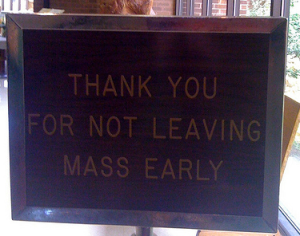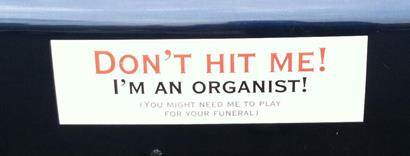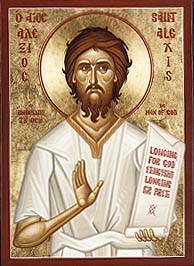
I think I’ve heard all the excuses. “I don’t want to stand in line, I want to get out of the parking lot first, I want to get a seat at the restaurant (really), I have other things I have to do, I don’t sing, I don’t like the last song, I, I, I….” My personal favorite: “I already got Jesus, so why do I need to stick around?” (Sure, but you might have missed the point…)
Maybe we’ve all offered one of these excuses at some point. There are so many reasons this is wrong, but first let’s look on the bright side. Here are 5 reasons for staying until the end of the Mass:
1) Show Jesus how important he is to you. You just received Holy Communion. You’ve received Jesus’ entire life, death and resurrection for the salvation of the world. Spend a couple minutes thanking him for this incredible gift he suffered for you. Show him this is the most important part of your day and week. He hung on the cross for 3 hours, you can wait with him for 3 minutes.
2) You have just been united in Christ with the entire Church, here on earth, in purgatory and in heaven by participating in this Sacrament. Yes, the Eucharist is a Sacrament every time. Show your unity and respect to the members of the Church that have gone before you.
3) You have united yourself in Christ with your parish community. To leave before everyone else is a sign of your disunity with your community. Even our responses to prayer and the dismissal are signs of our unity. Unite yourself with your community.
4) We pray together. The prayers at the end of Mass are great. Don’t believe me? The entire Mass is based on Sacred Scripture, up to the very end. The words of Scripture, the words of Mass are sacramental, that is, they make present the reality of Christ. Why would you walk out on the Word of God?
5) We sing together. The hymn can be a prayer, if your parish sings a thanksgiving hymn after communion or a recessional hymn. If you skip out when there is half a verse left, or just before the hymn, you miss praying together with one voice. If you don’t sing or don’t think you know the song, look at it at least. Pray the words. Unite your heart to the prayer of the whole Church.
There are a million more reasons I could give you. Remember who the very first person to leave Mass early was…there is a reason they call this the “Judas shuffle.”
If you’re confused about whether it is a sin or not: no, it is not seriously sinful, but it is extremely disrespectful, even more so if it is habitual. Are you only concerned about the bare minimum?
Besides, if you cut out early, you’ll miss important things happening in the parish community, and also the goodies when we have them after Mass…



